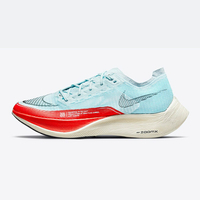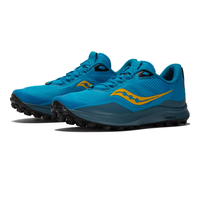The Nike Ultrafly isn’t built for speed like Nike’s Vaporfly and Alphafly road shoes, but does offer something for that extended time on the trails that delivers comfort in a smooth and steady fashion.
Pros
- +
Roomy toe box
- +
Smooth and consistent ride
- +
Grippy Vibram outsole
Cons
- –
Not built for speed
- –
Light on trails protection
- –
Best for moderate trails
Why you can trust TechRadar We spend hours testing every product or service we review, so you can be sure you’re buying the best. Find out more about how we test.
One minute review
If you’re the kind of runner who prefers to head out to the trails for hours as opposed to tackling the same stretch of pavement, the Nike Ultrafly is made for you.
The Ultrafly is designed to handle up to ultra distances including racing, grabbing elements from Nike’s best running shoes like its ZoomX foam and a carbon plate, which on paper makes it sound like a Vaporfly for the trails.
I’ve used a bunch of Nike’s trail shoes including the long distance, off-road focused Nike Wildhorse 8 and the ZoomX-packing Nike Zegama Trail. While I’ve enjoyed my time in the new Ultrafly, it’s not quite the shoe I thought it would be: it’s not zippy and quick like the Vaporfly is on roads, but it is a workhorse.
Nike Ultrafly: Specifications
Swipe to scroll horizontally
| Component | Nike Ultrafly |
| Weight: | 282g (Mens UK size 8) |
| Upper: | Vaporweave |
| Midsole | ZoomX |
| Outsole | Vibram Megagrip |
| Heel-to-toe drop | 8.5mm |
Nike Ultrafly: Price and availability
- Priced at $250 in the US
- £229.95 in the UK
- AU$330 in Australia
The Nike Ultrafly launched in July 2023 in limited quantities before going on wider release in August, priced at £229.95 / $250 / AU$ 330.
That put it around the same price as Nike’s Vaporfly road running shoe and also makes it pricier than standout trail shoes like the Hoka Speedgoat 5 and the Nike Wildhorse 8, another Nike trail shoe designed for long distance running.
- Value score: 3.5/5
Nike Ultrafly: Design
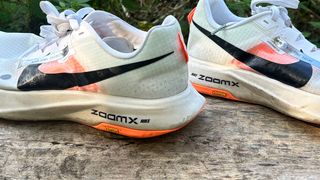
- Vaporweave upper
- Vibram Megagrip outsole
- Nike ZoomX foam
While the Ultrafly is built for the trails, it definitely has the look of one of Nike’s road shoes. There’s just the two colourway options, both with a mostly white upper that thankfully hasn’t become caked in mud as the trails I’ve tested them on have been mostly the dry and hard kind.
Dealing with the key specs, it’s got a 8.5mm drop: that’s 38.5mm at the heel and 30mm at the forefoot, so it’s a chunky shoe. For comparison, the ultra-focused Nike Wildhorse 8 has an 8mm drop coming in at 35.5mm at the heel and 27.5mm at the forefoot.
Nike uses an upper made from Vaporweave, which is built from a mixture of plastics and is similar to the upper material used on its road running shoes like the Zoom Fly and the first generation Vaporfly. While the upper looks pretty low volume, there’s a nice bit of stretch to it and it’s nice and roomy up front, making it ideal for going long where feet can swell and you need that extra space.
While the Ultrafly opens up at the toes, it narrows at the midfoot and at the heel to offer a good lockdown with not overly generous padding at the heel collar to offer some comfort further back. The laces are the standard kind that sit on top of a skinny tongue that offers some padding on top to make sure you don’t feel those laces if they’re tightly tied.
For the midsole, Nike is using the ZoomX foam it uses on its successful Vaporfly, Alphafly and Invincible road shoes. That midsole is wrapped in fabric to protect the foam and is designed to make it feel more stable than Nike’s road shoes. Nike also places a Carbon Flyplate between that ZoomX and fabric-wrapped midsole to help deliver smoother transitions.
In an interesting move from Nike, it included a Vibram Megagrip outsole to deliver off-road grip. Nike typically uses its own outsole technology, which I’ve had mixed experiences with. The decision to go with Vibram on the Ultrafly seems like a wise move as it’s the same outsole technology featured on other standout trail shoes including the Hoka Speedgoat 5.
Weight-wise, the Ultrafly weighed in at 282g in my UK size 8, which is lighter than something like the Nike Wildhorse 8, which weighed in at almost 320g in a UK size 8. While not super-light, it definitely didn’t feel heavy during runs and was comfortable enough to walk around in as well.
- Design score: 4/5
Nike Ultrafly: Performance
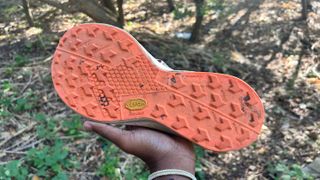
- Smooth, stable and consistent ride
- ZoomX isn’t bouncy like Nike road shoes
- Outsole works well on moderate trails and roads
If you’re hoping that the Ultrafly is going to give you that feeling of running in one of Nike’s carbon racing shoes, then that’s simply not the case here. This isn’t an aggressive, speed shoe that delivers an extremely bouncy feeling. It’s different, but in a good way.
I haven’t run an ultra in it, instead focusing on getting as much time on my feet as my current state of running fitness permits, maxing out a couple of hours on a mixture of trail surfaces. I’ve also been mixing in some road time and taking in some lighter, more challenging trail terrain. The first thing you notice about the Ultrafly is that it doesn’t feel built like Nike’s other trail shoes. That’s largely down to the roominess of that toe box.
The ZoomX foam typically delivers a very bouncy ride, just like it does in the Vaporfly and Invincible, but things are slightly more tempered here. Unfortunately, it just doesn’t deliver the same lively ride. What it does instead is provide comfort and that’s really what you need over longer distances.
As a package, it’s smooth and stable. It’s certainly not one that feels equipped for all-out speed and is better suited to cruising and moving at slightly more up-tempo speeds. It’s not super light or nimble, but it’s not overly heavy either to make it a taxing shoe to have on your feet as you roll through the miles.
It’s great to see that Nike has opted to plant on a Vibram outsole, which features on some of the best trail shoes in the business and feels like a step up in general on Nike’s trail shoe outsoles. The 3.5mm lugs aren’t exceptionally deep, which makes handling some road time in them absolutely fine, and in general, the grip was good across a mixture of terrain including mud, rockier surfaces, and tackling some hills. I do feel like on more technical trails and likely muddier ones, you’re going to want something a little more aggressive in the outsole department though.
In terms of protection on the trails, there doesn’t seem to be a huge amount going on here and plays into the idea that this is one best suited to lighter and more moderate routes as opposed to the more technical kind. Yes, the upper looks great and uses material that’s designed to prevent rips, but Nike does go pretty light on the protective features here.
Overall though, it’s a shoe that I’ve enjoyed spending time in. It does feel like a bit of a cruiser of a shoe that’s comfortable enough to wear outside of runs, and prioritizes offering a consistent feel from a not-too-heavy design that makes it ideal for long distance runs. It feels like a good start for the Ultrafly line with room to tweak things and for it to evolve to be a truly standout trail shoe to justify picking it up over other trail shoes that cost less.
- Performance score: 4/5
Nike Ultrafly: Scorecard
Swipe to scroll horizontally
| Category | Comment | Score |
| Value | Pricier than standard trail shoes. | 3.5/5 |
| Design | Nike’s usual attention to detail is here, and the carbon plate/ZoomX combo works offroad. | 4/5 |
| Performance | A long-distance workhorse, although less suited for very technical trails. | 4/5 |
Nike Ultrafly: Should I buy?
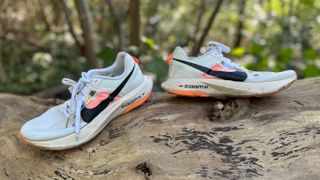
Buy it if…
You want a comfortable trail running shoe for longer distances
From the spacious toebox, slightly plush ZoomX and upper padding in the right places, the Ultrafly is built for comfort.
You want a trail running shoe to cruise in
The Ultrafly is about rolling your through that bigger mileage with stable foundations and a consistent ride very much at the heart of it all.
